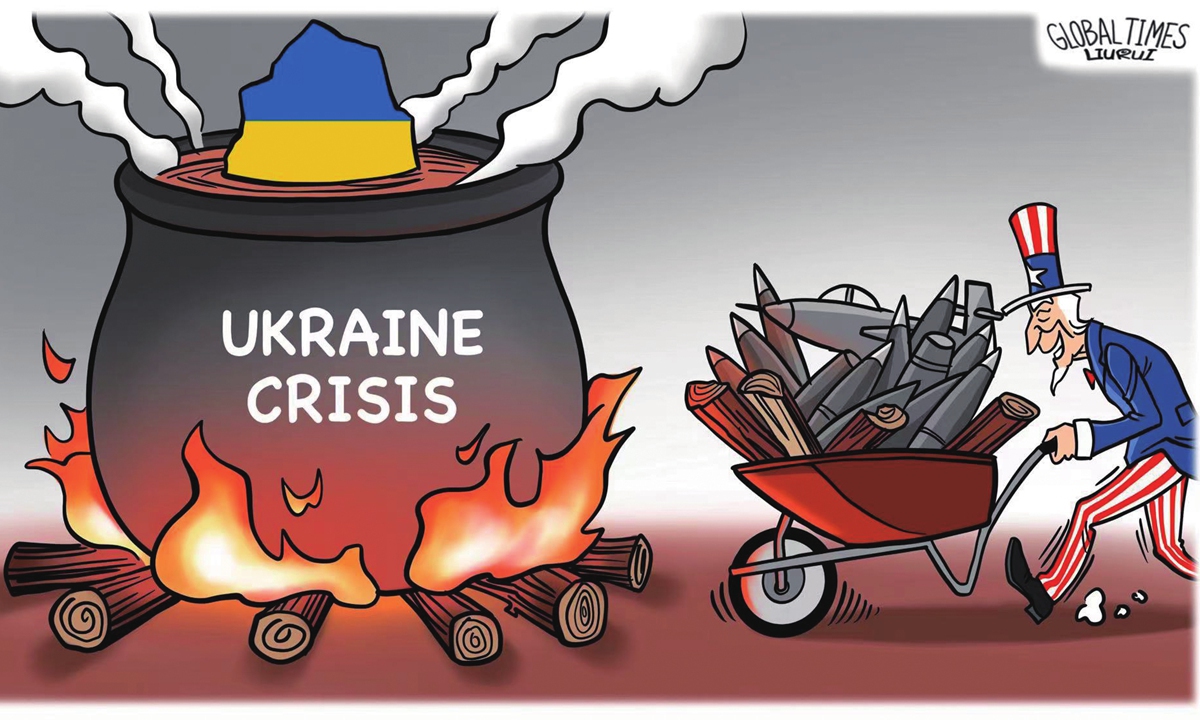
Illustration: Liu Rui/GT
US President Joe Biden announced on Wednesday a new $700 million weapons package for Ukraine that will include high mobility artillery rocket systems (HIMARS), which can accurately hit targets from as far as 80 kilometers away, according to Reuters. The move sparked strong dissatisfaction in Russia. Russian Foreign Minister Sergei Lavrov said, "It is a direct provocation [by Ukraine], aimed at involving the West in military action."
HIMARS units can even launch missiles as far as 300 kilometers if carrying the Army Tactical Missile Systems (ATACMS). The systems are able to smother a target of the Russian army at long range, and even strikes targets in Russian territory. The US has said it will not provide Ukraine with ATACMS. Future provision of the system doesn't seem very possible either, since the US is not likely to equip the Ukrainian army with a long-range strike capability of more than 100 kilometers.
Nonetheless, the HIMARS could still cause some harm to Russian forces if put into the battle field. The firing range of the 155mm howitzers previously provided by the US to Ukraine is 20 to 30 kilometers, not more than 40, while that of the HIMARS is at least twice of the former.
US Secretary of State Antony Blinken claimed that the Ukrainians had given the US assurances that they will not use these systems against targets located in Russian territory. However, any piece of weaponry, once in the hands of one side in a war, will be abused in every way possible. These so-called political promises cannot be relied upon. Once the HIMARS are delivered to the Ukrainian army, it will be up to the Ukrainians to decide which targets to pick and choose, not the Americans. In fact, Kremlin spokesperson Dmitry Peskov has said Moscow did not trust such assurances.
Once the HIMARS are used against targets in Russian territory and leading to direct damage, it will certainly result in further escalation of the military conflict between Russia and Ukraine, and the Russian army will keep increasing its retaliation against the Ukrainian side. Ultimately Ukraine will pay a greater price, both in terms of land loss and human casualties.
From the Russian point of view, it is necessary to eliminate these systems before they are put into the battlefield, preferably before they enter the territory of Ukraine or in transit, and at worst before it is already in position to the front line and put into use. The Russian military also has the strength to eliminate the HIMARS, as both the Iskander, a short-range ballistic missile system, and Kalibr cruise missiles can effectively deal with the HIMARS.
The US provision of HIMARS to Ukraine is a political act. So far, Washington has not been satisfied with the performance of the Ukrainian army, which, however, has attributed the fault to the lack of US military assistance and has therefore been asking for more powerful weaponry, including the HIMARS.
The reason why the US is now willing to provide Ukraine with the HIMARS is, on the one hand, to show their full support for Ukraine. On the other hand, the US, on a hope and a prayer, is wishing that the HIMARS will be effective in stalling the Russian offensive, and thus reverse the unfavorable situation for Ukraine.
However, it should be noted that one weapons system or item equipment alone, including HIMARS, is not enough to be a battlefield killer, nor is it likely to change the overall situation, for any military conflict is a contest between two sides in terms of comprehensive strength and morale. In addition, there is no need to exaggerate the function of these systems, since the Ukrainian army has not been trained to use the systems and may not be familiar with its usage. It is unrealistic for both the US and Ukraine to expect to achieve the strategic goals by offering up a single weapon.
To a certain extent, the US provides the systems to Ukraine only to strengthen their courage. Neither the US nor Ukraine should expect that the Russian military will be defeated and the Ukrainian army can gain the upper hand, with only the help of the rocket systems.
The author is a Chinese mainland military expert and TV commentator. opinion@globaltimes.com.cn




